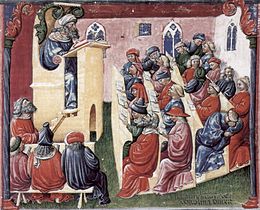
Back Skolastiek Afrikaans مدرسية (فلسفة) Arabic سكولايه ARZ Escolástica AST Sxolastika Azerbaijani اسکولاستیک AZB Схаластыка Byelorussian Схоластика Bulgarian Skolastika BS Escolàstica Catalan

| Part of a series on |
| Scholasticism |
|---|
 |
Scholasticism was a medieval school of philosophy that employed a critical organic method of philosophical analysis predicated upon the Aristotelian 10 Categories. Christian scholasticism emerged within the monastic schools that translated scholastic Judeo-Islamic philosophies, and thereby "rediscovered" the collected works of Aristotle. Endeavoring to harmonize his metaphysics and its account of a prime mover with the Latin Catholic dogmatic trinitarian theology, these monastic schools became the basis of the earliest European medieval universities, contributing to the development of modern science; scholasticism dominated education in Europe from about 1100 to 1700.[1] The rise of scholasticism was closely associated with these schools that flourished in Italy, France, Portugal, Spain and England.[2]
Scholasticism is a method of learning more than a philosophy or a theology, since it places a strong emphasis on dialectical reasoning to extend knowledge by inference and to resolve contradictions. Scholastic thought is also known for rigorous conceptual analysis and the careful drawing of distinctions. In the classroom and in writing, it often takes the form of explicit disputation; a topic drawn from the tradition is broached in the form of a question, oppositional responses are given, a counterproposal is argued and oppositional arguments rebutted. Because of its emphasis on rigorous dialectical method, scholasticism was eventually applied to many other fields of study.[3][4]
Scholasticism was initially a program conducted by medieval Christian thinkers attempting to harmonize the various authorities of their own tradition, and to reconcile Christian theology with classical and late antiquity philosophy, especially that of Aristotle but also of Neoplatonism.[5] The Scholastics, also known as Schoolmen,[6][7] included as its main figures Anselm of Canterbury ("the father of scholasticism"[8]), Peter Abelard, Alexander of Hales, Albertus Magnus, Duns Scotus, William of Ockham, Bonaventure, and Thomas Aquinas. Aquinas's masterwork Summa Theologica (1265–1274) is considered to be the pinnacle of scholastic, medieval, and Christian philosophy;[9] it began while Aquinas was regent master at the studium provinciale of Santa Sabina in Rome, the forerunner of the Pontifical University of Saint Thomas Aquinas, Angelicum. Important work in the scholastic tradition has been carried on well past Aquinas's time, such as English scholastics Robert Grosseteste and his student Roger Bacon, and for instance by Francisco Suárez and Luis de Molina, and also among Lutheran and Reformed thinkers.
- ^ See Steven P. Marone, "Medieval philosophy in context" in A. S. McGrade, ed., The Cambridge Companion to Medieval Philosophy (Cambridge: Cambridge University Press, 2003). On the difference between scholastic and medieval monastic postures towards learning, see Jean Leclercq, The Love of Learning and the Desire for God (New York: Fordham University Press, 1970) esp. 89; 238ff.
- ^ Gracia, Jorge JE, and Timothy B. Noone, eds. A companion to philosophy in the middle ages. John Wiley & Sons, 2008, 55–64
- ^ Patte, Daniel. The Cambridge Dictionary of Christianity. Ed. Daniel Patte. New York: Cambridge University Press, 2010, 11132-1133
- ^ Grant, Edward. God and Reason in the Middle Ages. Cambridge University Press, 2004, 159
- ^ Particularly through Pseudo-Dionysius, Augustine, and Boethius, and through the influence of Plotinus and Proclus on Muslim philosophers. In the case of Aquinas, for instance, see Jan Aertsen, "Aquinas' philosophy in its historical setting" in The Cambridge Companion to Aquinas, ed. Norman Kretzmann and Eleonore Stump (Cambridge: Cambridge University Press, 1993). Jean Leclerq, The Love of Learning and the Desire for God (New York: Fordham University Press, 1970).
- ^ "Schoolmen". Dictionary.com Unabridged (Online). n.d.
- ^ Campbell, Timothy P.; Harrison, Timothy M.; McDonagh, Josephine; Saltzman, Benjamin A., eds. (May 1950). "Modern Philology". University of Chicago Press. 47 (4). doi:10.1086/mp.1950.47.issue-4. ISSN 0026-8232. Retrieved 15 June 2023.
- ^ Grant, Edward. God and Reason in the Middle Ages. Cambridge University Press, 2004, 56
- ^ Gilson, Etienne (1991). The Spirit of Medieval Philosophy (Gifford Lectures 1933–35). Notre Dame, IN: University of Notre Dame Press. p. 490. ISBN 978-0-268-01740-8.
© MMXXIII Rich X Search. We shall prevail. All rights reserved. Rich X Search